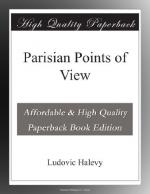“No.”
“And the day after that?”
“No, nor then.”
“At last, after three days, mamma took me to the races at the Bois de Boulogne. We arrived, and there at once, two steps from me, I saw him. But no, it was no longer he; frigid greeting, frigid good-day, frigid hand-shake, frigid words, and very few of them—scarcely a few sentences, awkward and embarrassed. Then he was lost in the crowd, and that was all. He did not appear again. I was dumfounded, overcome, crushed.”
“But it was your mother who—”
“Yes, I know now; but I did not know that day. Yes, it was mamma. Oh, must I not love mamma to have forgiven her that?”
“She had come to me very early in the morning the day after the very eloquent hand-shake and there, in tears—yes, literally in tears (she was sobbing)—she had appealed to my sense of honor, of delicacy, of integrity. ‘You both had,’ she said to me, ’yesterday, on seeing each other again after a long absence, a little spasm of emotion. That is all right; but you must stop there, and not prolong this foolishness,’ And, just as I was going to protest: ‘Oh yes; foolishness!’ ’Remember, Marceline’s happiness is at stake. You have no right to compromise her. You come back from China all at once, and your abrupt return will break off more sensible, more studied arrangements. M. de Courtalin is thirty-four; he is a man of great knowledge and wisdom. However, I know that that is only a secondary consideration; but love passes away, and money remains, and M. de Courtalin is richer, very much richer, than you. With him Marceline will have quite a grand position. Whereas you, you know how I love you, and I know how worthy you are of being loved. You are charming, charming, charming.’ It was your mother who spoke thus.”
“I know; I know.”
“’Yes, charming; but when I have said that, I have said all. So I will ask you this question, and I expect from you a faithful answer: Have you those solid qualities which alone can make a husband, a true husband? Marceline is a little light-headed, a little frivolous, a little coquettish.’ It is always your mother who is speaking.”
“I know; I know.”
“I was embarrassed, Aunt Louise; it seemed to me that that speech was not without reason. I hadn’t a very high idea of myself as a husband, and even now I ask myself—”
“Don’t ask yourself anything. Be an affectionate husband, and you will have all the virtues. Nothing simpler, as you see. You can go on.”
“Well, your mother was so skilfully persuasive that the day after, at the races, I gave that cold greeting.”




